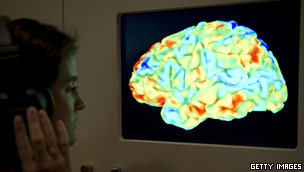Be brainy, be bilingual 雙語能增強大腦能力
英語學習點:有關科學實驗的詞語 Vocabulary: scientific experiment

Learning a second language can boost brain power, scientists believe.
US researchers from Northwestern University say bilingualism is a form of brain training - a mental "work out" that fine-tunes the mind.
Speaking two languages profoundly affects the brain and changes how the nervous system reacts to sound, lab tests revealed.
Experts say the work peer-reviewed in Proceedings of the National Academy of Sciences provides "biological" evidence of this.
In an attempt to prove the hypothesis that speaking two languages is good for one's mind, the team monitored how the brain of 48 healthy student volunteers reacted to different sounds. Twenty three of these volunteers were bilingual.
收聽與下載
The scientists used scalp electrodes to trace the pattern of brainwaves.
Under quiet, laboratory conditions, the bilingual students responded in a similar way to the English-only-speaking students, who formed the control group.
But the bilingual group were far superior at processing sounds even when there were a lot of people talking in the room. They were better able to tune in to the important information - the speaker's voice - and block out other distracting noises.
Prof Nina Kraus, who led the research, said: "The bilingual's enhanced experience with sound results in an auditory system that is highly efficient, flexible and focused in its automatic sound processing, especially in challenging or novel listening conditions."
Co-author Viorica Marian said: "People do crossword puzzles and other activities to keep their minds sharp. But the advantages we've discovered in dual language speakers come automatically simply from knowing and using two languages.''
Musicians appear to gain a similar benefit when rehearsing, say the researchers.
According to some theories, being bilingual might help ward off dementia.
Glossary 詞匯表 (點擊單詞收聽發(fā)音)
- to work out鍛煉
- to fine-tune微調
- the nervous system神經系統(tǒng)
- a lab test試驗室測驗
- peer-review同級評估
- evidence證據(jù)
- a hypothesis假想
- to monitor something監(jiān)視(什么)
- an electrode電極
- laboratory conditions(在)試驗室條件(下)
- a control group控制組
- to tune in to (something)收聽(什么東西)/入耳
- to block (something) out排斥(什么)
- the auditory system聽覺系統(tǒng)
- to process (something)處理(什么)
- to keep (one's) mind sharp讓(他們的)大腦敏捷
- a theory理論
- to ward (something) off擋避(什么)